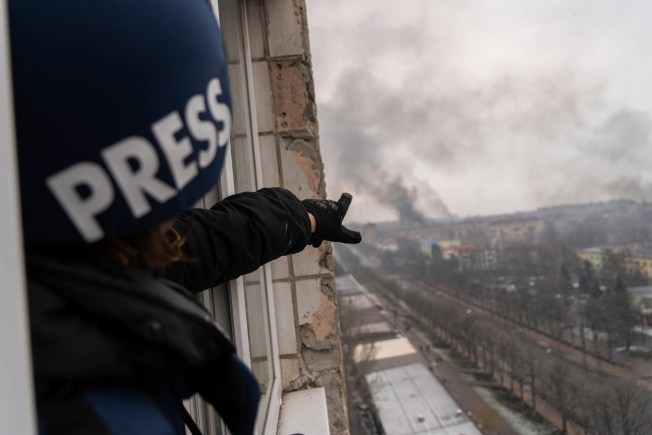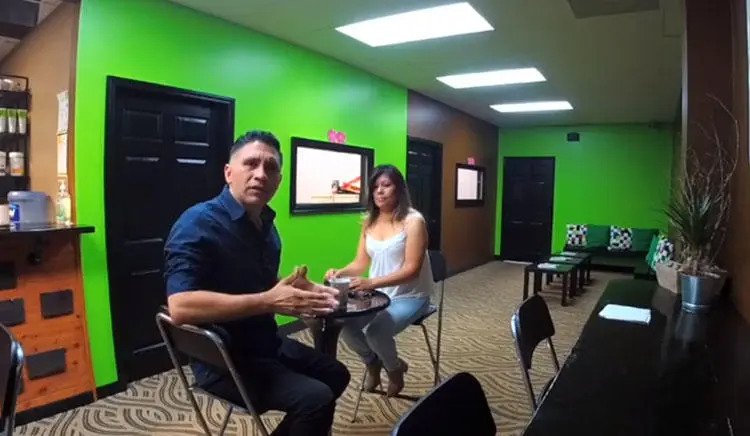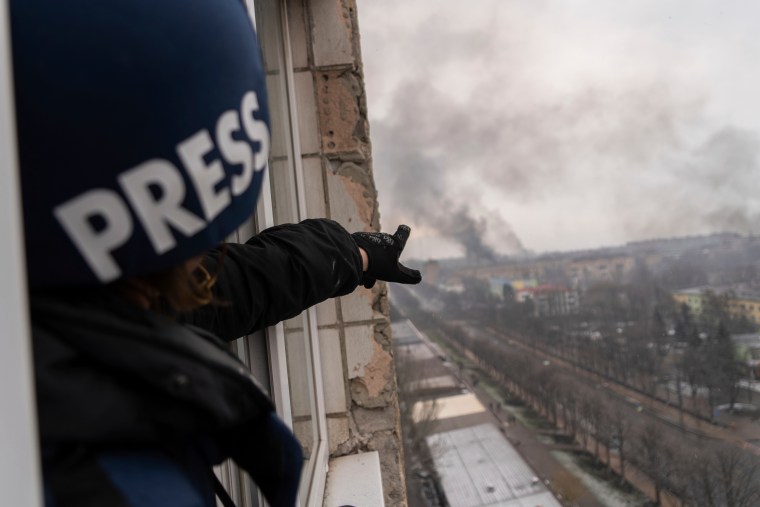CPJ on Ukraine: How the situation for journalists has changed
One month ago, we spoke with Gulnoza Said, CPJ’s Europe and Central Asia program coordinator, about what to expect for journalists as Russia invaded Ukraine. Now, after a month of fighting, Said speaks on how the situation has changed for journalists covering the war–and what CPJ has been doing to help them.

In a little more than a month of war in Ukraine–and in what remains a fluid situation–how have the risks to journalists shifted?
Russia’s war on Ukraine has been fatal for journalists–five journalists have been killed while on duty since the beginning of the full-scale war on February 24. We investigated several other journalists’ deaths but could not confirm that they were killed while on assignment (they were Ukrainian journalists who enlisted in the army when the invasion started and were killed as soldiers).
We have reported on many incidents of journalists, foreign and local, who have been wounded–some very seriously, requiring multiple surgeries.
The risk of being taken hostage also proves to be a concern. We have already seen many cases of journalists whom Russian forces took hostage. Most have been released but some have not. In one such case, a female journalist, Iryna Dubchenko, was taken hostage in her town of Rozivka, but then forcefully transported to Donetsk, the area in Ukraine’s east that has been controlled by Russia-backed separatists since 2014. That’s a very serious situation because in the past, we worked on a case of a Ukrainian journalist who spent 2.5 years at hands of separatists, and he told CPJ he was tortured and forced to confess to crimes, such as espionage, that he did not commit. We are very concerned about Dubchenko’s plight.
CPJ Executive Director Robert Mahoney referred to the media landscape in Russia as an “information dark age.” What is happening to Russian journalists?
Yes, Russian authorities’ repressive policies have pushed the country into the “information dark age,” as Rob stated. The flagship independent media outlets, such as Ekho of Moscow, Rain TV and Novaya Gazeta have been either closed or suspended their work. Others had their websites blocked in Russia, because the Kremlin decided to put a tight lid on the reporting of the war, banning the use of words like “war” and “invasion.” The authorities adopted new legislation that can penalize any independent reporting on the war with a prison sentence of up to 15 years. Independent Russian journalists have been fleeing Russia in droves. Now, not a day goes by without us receiving a plea for help from Russian journalists in exile.
What is CPJ doing to help?
Since the start of the war, we’ve been helping a range of journalists. First of all, there are Ukrainian journalists still working in Ukraine. They need to stay alive and safe. Many of the requests we receive from local journalists are about the need for personal protective equipment (PPE), specifically for bulletproof vests and helmets.
CPJ is also providing safety information for journalists who are traveling to Ukraine to cover the war – providing them with CPJ resources in multiple languages and answering specific safety questions as they arise.
Then there are the journalists who fled Ukraine. There are Ukrainian journalists among them, but also other groups. For example, since the media crackdown which followed the contested August 2020 presidential elections in Belarus, many journalists have been jailed, but dozens initially fled Belarus and found refuge in Ukraine. When the war broke, they found themselves having to flee once more.
Although all of them are fleeing from the war and destruction, for some non-Ukrainian citizens, going to European countries, or accessing services may be a bigger challenge because of the passports they hold. And of course, we are helping Russian journalists who fled Russia in recent weeks.
For journalists fleeing both countries, we have been responding to requests to help them as they relocate to safety.
Finally, there are journalists of shuttered independent media outlets who remain in Russia. They need help with staying afloat until they find a new job – a challenge likely to grow in the immediate future.
Manuel Duran, journalist who fled El Salvador years ago, granted asylum

Following years of legal battles facing deportation, journalist Manuel Duran Ortega was granted asylum in the United States.
Duran fled to the U.S. in 2006 after receiving death threats for his work as a television reporter in El Salvador, and a year later received a deportation order from Immigration and Customs Enforcement (ICE).
Duran founded the Spanish-language news site Memphis Noticias, and over the years had reported critically on both ICE and the police department in Memphis, Tennessee, where he was based.
Then, in April 2018, he was arrested in Memphis while reporting on a protest against immigration detention despite wearing business attire and a press badge. At the time of his arrest, Kristi Graunke, from the Southern Poverty Law Center (SPLC), which represented Duran throughout his detention, told CPJ that the legal rights group believed the arrest and subsequent detention were retaliatory for his critical reporting.
Yet even after winning a stay of deportation, Duran remained in custody in Louisiana.
For years, CPJ has provided support to Duran, filing amicus briefs and sending letters of support on his behalf.
“His battle was a long one,” his lawyers told CPJ, “from an immigration judge, to the Board of Immigration Appeals, to the Eleventh Circuit and then back to the Board of Immigration Appeals and a new immigration judge. Along the way, this coalition of amici news organizations stepped in, without fail, to support Manuel by way of extensive and repeated amicus briefing on a wide array of issues. Today, that support, your support, paid off in a way that defies description.”
“This victory is dedicated to all the journalists being persecuted in this moment,” Duran said in a statement provided by SPLC, “because no journalist should have to fear to do their job.”
Must-reads
Earlier this month, CPJ joined 57 other civil society groups in calling for the U.S. Congress to reauthorize and strengthen the Global Magnitsky Human Rights Accountability Act, which could be used to apply sanctions on human rights abusers, including those responsible for “the grim horrors unleashed on the civilian population” in Ukraine.
CPJ’s former executive director, Ann Cooper, who was also NPR’s Moscow bureau chief in the early 90s, takes a close look at Vladimir Putin’s 22-year fight against media freedom in Russia–all the way back to a quarter-century old CPJ report which showed “ominous signs that independent journalism faces a bleak future under the Putin regime.”
CPJ spoke with 4 journalists covering the war in Ukraine about the physical and emotional toll their work can take. “I had so many different internal reactions,” says Oleksandr Ratushnyak, a Ukrainian freelance photographer, “…panic, fear, danger, [the need for] security and protection, pain, anger, love. War exacerbates many feelings.”
CPJ in the news
“Ethiopia urged to uphold press freedom and release reporter,” ABC News
“For journalists, Ukraine is a WhatsApp war,” Columbia Journalism Review
“Rights watchdog condemns Taliban for detaining journalists,” Arab News
“Russia’s Novaya Gazeta Suspends Publication After Warnings,” VOA News
“Rival Networks Aided Fox News After Ukraine Tragedy, Highlighting War-Zone Collaboration,” The Wall Street Journal
“Russian Journalist Flees Country Amid Pressure From Officials,” RFE/RL
“ICE Is Creating A New Policy For Subpoenaing Reporters After Trying To Force BuzzFeed News To Turn Over Information,” BuzzFeed News
“For Iranian journalist Mohammad Mosaed, exile was a last resort, but silence is not an option,” The Globe and Mail
